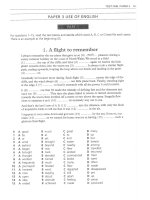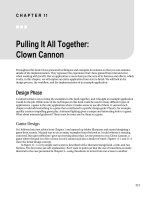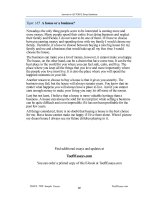Altogether vs all together
Bạn đang xem bản rút gọn của tài liệu. Xem và tải ngay bản đầy đủ của tài liệu tại đây (12.75 KB, 2 trang )
Altogether vs. All Together
As with other homophones (words that are pronounced the same but have different meanings and oftentimes
spelling), it is not suprising for people to be confused about the words altogether and all together.
Below are simple tips on how we can unknot this issue.
Altogether is an adverb that means “completely/totally,” “including everything,” or “taking everything into
consideration.” Since it functions as an adverb, altogether cannot be used in a sentence without a verb that it
describes. Below are examples of the proper use of altogether:
“Embarrassment as final Divergent movie to skip cinemas altogether”
Daily Star
“Toyota seeks to stop investing in diesel engines altogether: exec”
Green Car Reports
In the first two examples, you can subsititute altogether with completely or totally and there would not be any
change in the meaning of the sentence.
“Paper Round: Russia to be banned from Rio altogether, Arsenal want Mahrez and Lacazette for £75m”
Eurosport
This particular sentence indicates that taking everything in consideration, Russia will be banned from the Rio
Olympics.
On the other hand, the two-word phrase all together means “all in one place or in a group” or “all at once.”
“CONNIE MACK BASEBALL: Towamencin puts it all together at right time”
Montgomery Newspapers
In this example, all together is used to indicate that all the Towamencin baseball team players come together as
a group in a timely manner.
“National Parks May Be The Thing That Will Bring Us All Together”
GOOD Magazine
This sentence denotes that national parks may be able to bring people all in one place.
“Ex-Chelsea man looking to put it all together for Hartlepool”
Hartlepool Mail
This last example sends the message that a former Chelsea football player is planning to give his best all at once
for Hartlepool.
In summary, you can avoid misusing altogether and all together by simply remembering their uses. If you can
substitute the term with completely for your sentence and it is used as an adverb, then you should choose
altogether. Meanwhile, if you can use all and together separately in the sentence, then the correct term to use is
all together.
Can you come up with your own sentences using altogether and all together?
Stay on top of your writing! Download our grammar guide from www.englishgrammar.org to stay up-to-date.
Powered by TCPDF (www.tcpdf.org)









